Maintaining optimal water quality is paramount in fish keeping to ensure the health and well-being of aquatic life. Understanding the intricacies of water parameters and their impact on fish is essential for any aquarist.
Understanding Water Parameters
pH levels
The pH level of water indicates its acidity or alkalinity, which can significantly influence fish health. Different fish species have specific pH requirements, and maintaining the correct pH range is crucial for their survival and overall well-being.
Ammonia, Nitrite, and Nitrate Levels
Ammonia, nitrite, and nitrate are byproducts of fish waste and decomposing organic matter. Elevated levels of these compounds can be toxic to fish, leading to stress, illness, and even death. Regular monitoring and control of ammonia, nitrite, and nitrate levels are essential for a healthy aquarium environment.
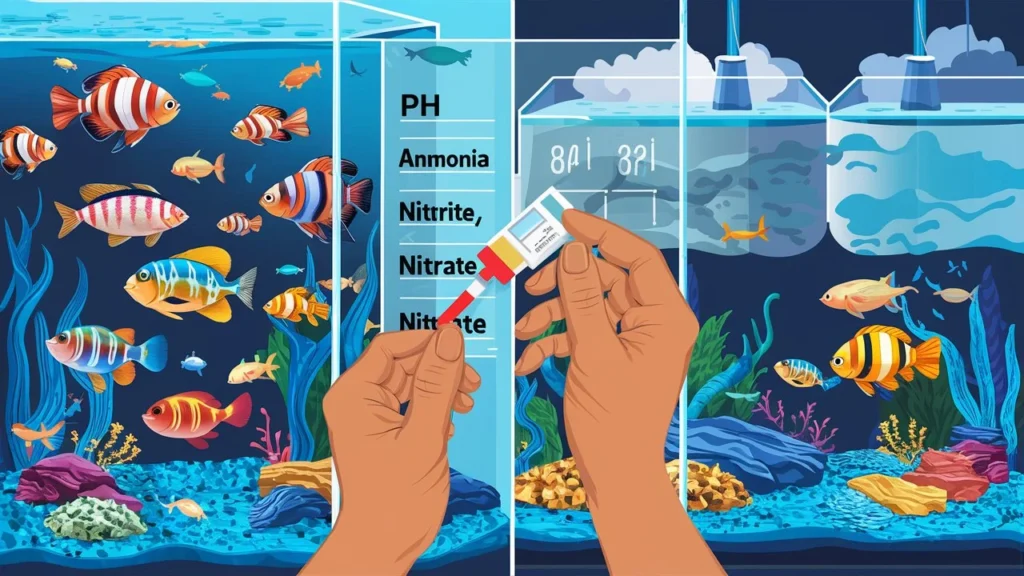
Temperature Control
Maintaining a stable water temperature is vital for the health of fish and other aquatic organisms. Sudden fluctuations in temperature can cause stress and weaken the immune system of fish, making them more susceptible to diseases.
Hardness and Softness of Water
The hardness and softness of water refer to its mineral content, primarily calcium and magnesium ions. Certain fish species prefer soft water, while others thrive in harder water conditions. Understanding the water hardness requirements of your fish is crucial for their long-term health and vitality.
Effects of Poor Water Quality
Poor water quality can have detrimental effects on fish and the overall ecosystem of the aquarium.
Stress and Illness in Fish
High levels of toxins such as ammonia and nitrite can stress fish, making them more susceptible to diseases such as fin rot, ich, and bacterial infections. Additionally, fluctuations in pH and temperature can further contribute to fish stress and compromise their immune system.
Algae Overgrowth
Excessive nutrients in the water, coupled with inadequate maintenance, can lead to algae overgrowth. Algae blooms not only detract from the aesthetics of the aquarium but also compete with fish and plants for oxygen and nutrients, potentially disrupting the delicate balance of the ecosystem.
Increased Risk of Fish Mortality
Uncontrolled water parameters and poor water quality can ultimately result in fish mortality. Toxic levels of ammonia and nitrite can cause irreversible damage to fish organs, leading to organ failure and death. Additionally, untreated diseases stemming from poor water quality can quickly spread throughout the aquarium, further endangering the fish population.
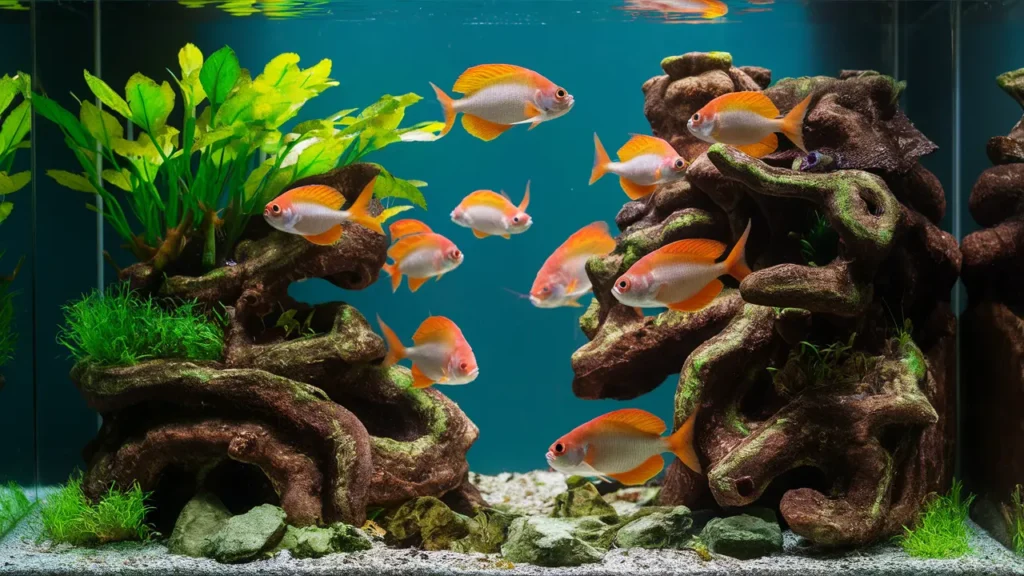
Maintaining Water Quality
To ensure optimal water quality, regular maintenance and monitoring are essential.
Regular Water Testing
Regular testing of water parameters such as pH, ammonia, nitrite, nitrate, and temperature is critical for identifying any imbalances or potential issues in the aquarium. Testing kits are readily available and should be used according to the specific requirements of your fish species.
Proper Filtration Systems
Investing in a high-quality filtration system is essential for removing waste, debris, and harmful toxins from the water. Filtration systems help maintain water clarity and promote a healthy aquatic environment by providing mechanical, chemical, and biological filtration.
Water Changes and Cycling
Regular water changes are necessary to remove accumulated toxins and replenish essential minerals and trace elements. Additionally, properly cycling a new aquarium before introducing fish is crucial for establishing beneficial bacteria colonies that aid in biological filtration.
Choosing the Right Fish for Your Water
Matching fish species to the water parameters of your aquarium is key to their long-term health and well-being.
Matching Fish Species to Water Conditions
Researching the specific water requirements of different fish species is essential for creating a harmonious and thriving aquarium community. Some fish prefer acidic water with a low pH, while others thrive in alkaline water with a higher pH. By selecting fish species that are compatible with your water parameters, you can minimize stress and ensure optimal conditions for all inhabitants.
Researching Fish Compatibility
In addition to water parameters, it’s essential to consider the social behavior and compatibility of fish species when stocking your aquarium. Aggressive or territorial fish may pose a threat to more peaceful species, leading to conflicts and stress within the community. Conducting thorough research on fish compatibility can help prevent potential conflicts and promote a harmonious aquarium environment.
Importance of Aquatic Plants
Aquatic plants play a crucial role in maintaining water quality and promoting a balanced ecosystem within the aquarium.
Natural Filtration
Aquatic plants absorb excess nutrients such as nitrates, phosphates, and carbon dioxide, helping to prevent algae overgrowth and maintain water clarity. Additionally, the root systems of plants provide a habitat for beneficial bacteria that contribute to biological filtration, further improving water quality.
Oxygenation of Water
During photosynthesis, aquatic plants release oxygen into the water, which is essential for the respiration of fish and other aquatic organisms. Adequate oxygenation ensures that fish have a constant supply of oxygen, reducing the risk of suffocation and promoting their overall health and vitality.
Common Water Quality Issues
Several common water quality issues can arise in aquariums, affecting the health and well-being of fish and other inhabitants.
Cloudy Water
Cloudy water is often caused by suspended particles, algae blooms, or bacterial growth. Proper filtration, regular water changes, and maintenance can help clarify the water and restore a healthy aquatic environment
High Ammonia or Nitrite Levels
High levels of ammonia or nitrite are toxic to fish and can quickly lead to illness and mortality. Prompt action, such as water changes and the addition of bacterial supplements, is necessary to reduce ammonia and nitrite levels and prevent further harm to fish.
Excessive Algae Growth
Excessive algae growth is typically a sign of nutrient imbalance and poor water quality. Implementing proper aquarium maintenance practices, such as regular water changes, algae scrubbing, and controlling nutrient levels, can help prevent and mitigate algae outbreaks.
Tips for Improving Water Quality
Maintaining optimal water quality requires proactive management and attention to detail.
Avoid Overfeeding
Overfeeding can lead to excess waste production and nutrient buildup in the aquarium, contributing to poor water quality and algae overgrowth. Feeding fish sparingly and removing any uneaten food can help prevent these issues and promote a healthier aquatic environment.
Keep the Tank Clean
Regular maintenance tasks, such as vacuuming substrate, scrubbing algae, and cleaning filter media, are essential for removing accumulated waste and debris from the aquarium. A clean tank reduces the risk of water quality issues and promotes the overall well-being of fish and other inhabitants.
Monitor Water Parameters Regularly
Regular testing of water parameters is crucial for identifying any imbalances or fluctuations that may impact fish health. Establishing a consistent testing schedule and recording results can help track changes over time and detect potential issues before they escalate.
Investing in Quality Equipment
Quality equipment is essential for maintaining a healthy and thriving aquarium environment.
Quality Filters and Pumps
Investing in a high-quality filtration system and water pump is essential for effective water circulation and filtration. A reliable filtration system removes waste and toxins from the water, while a powerful water pump ensures adequate oxygenation and circulation throughout the aquarium.
Reliable Testing Kits
Using reliable testing kits is essential for accurate monitoring of water parameters. Choose testing kits from reputable brands that provide accurate and consistent results to ensure the health and well-being of your fish.
Educating Yourself on Fish Keeping
Continuous learning and research are fundamental aspects of successful fish keeping.
Continuous Learning and Research
Stay informed about the latest developments and best practices in fish keeping by reading books, articles, and online forums dedicated to the hobby. Additionally, joining local fish clubs and attending aquarium-related events can provide valuable insights and support from experienced aquarists.
Seeking Advice from Experienced Aquarists
Don’t hesitate to seek advice and guidance from experienced aquarists and professionals in the field. They can offer valuable tips, recommendations, and troubleshooting advice to help you overcome challenges and achieve success in fish keeping.
Benefits of Optimal Water Quality
Maintaining optimal water quality offers numerous benefits for both fish and aquarists alike.
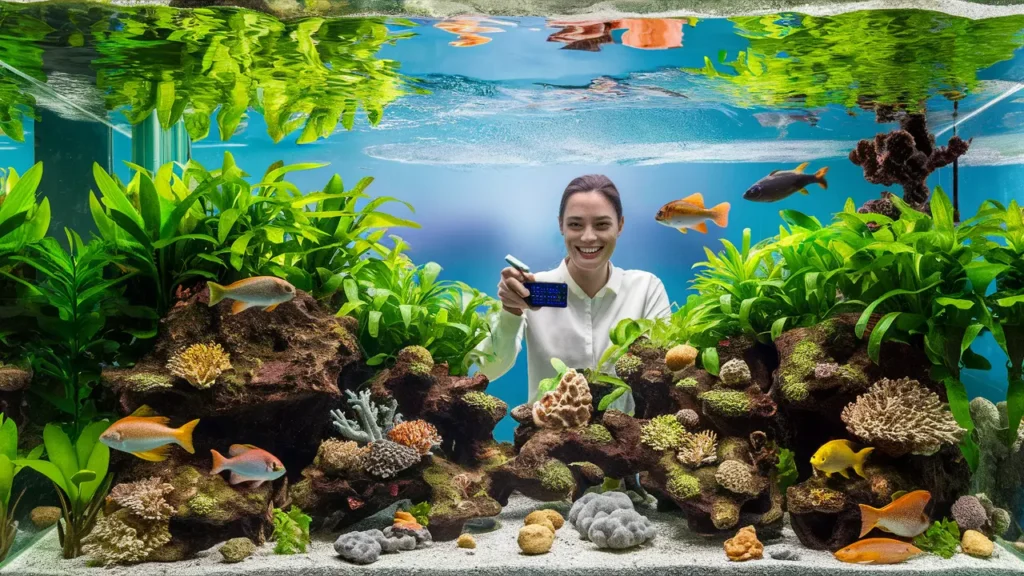
Healthy and Vibrant Fish
Optimal water quality promotes the health and vitality of fish, resulting in vibrant colors, robust growth, and increased longevity. Healthy fish are more active, resilient, and less susceptible to diseases, providing a rewarding and enjoyable experience for aquarists.
Clear and Aesthetically Pleasing Aquarium
A well-maintained aquarium with optimal water quality is visually appealing and enhances the beauty of any space. Clear water, healthy plants, and colorful fish create a captivating underwater landscape that captivates and inspires both aquarists and observers alike.
Addressing Water Quality Concerns
Addressing water quality concerns promptly is crucial for preventing further harm to fish and restoring a healthy aquatic environment.
Troubleshooting Common Issues
Identifying the underlying cause of water quality issues is the first step in addressing them effectively. Whether it’s excessive algae growth, high ammonia levels, or cloudy water, conducting a thorough assessment of the aquarium and implementing targeted solutions is essential for resolving the problem.
Seeking Professional Help if Necessary
If water quality issues persist despite your best efforts, don’t hesitate to seek professional help from experienced aquarists or aquatic specialists. They can provide expert advice, diagnostic testing, and personalized recommendations to help you overcome challenges and achieve optimal water quality in your aquarium.
Conclusion
In conclusion, maintaining optimal water quality is essential for the health and well-being of fish and other aquatic organisms in the aquarium. By understanding the importance of water parameters, implementing proper maintenance practices, and investing in quality equipment, aquarists can create a thriving aquatic environment that fosters the growth and vitality of their fish. Prioritizing water quality not only enhances the beauty of the aquarium but also ensures a rewarding and enjoyable experience for aquarists of all levels.
Unique FAQs
1. How often should I test my aquarium water?
– It’s recommended to test your aquarium water weekly, especially for parameters such as pH, ammonia, nitrite, and nitrate. More frequent testing may be necessary in newly established tanks or during periods of increased biological activity.
2. What should I do if my fish show signs of stress or illness?
– If your fish exhibit symptoms of stress or illness, such as lethargy, loss of appetite, or abnormal behavior, promptly assess water quality parameters and address any issues detected. Additionally, consider quarantining affected fish and consulting with a veterinarian or experienced aquarist for further guidance and treatment options.
3. How can I prevent algae overgrowth in my aquarium?
– To prevent algae overgrowth, maintain balanced water parameters, avoid overfeeding, implement regular water changes, and incorporate algae-eating fish or invertebrates into your aquarium ecosystem. Additionally, ensure adequate lighting levels and consider using a timer to regulate the duration of light exposure.
4. What are some signs of poor water quality in an aquarium?
– Signs of poor water quality include cloudy or murky water, algae overgrowth, foul odors, stressed or lethargic fish, abnormal behavior, and increased mortality rates. Regular monitoring of water parameters and visual assessment of the aquarium can help detect and address potential issues early on.
5. How can I acclimate new fish to my aquarium?
– To acclimate new fish to your aquarium, float the bag containing the fish in the tank for approximately 15-20 minutes to equalize temperature. Then, gradually introduce small amounts of aquarium water into the bag over a period of 30-60 minutes to allow the fish to adjust to the water chemistry. Finally, gently net the fish and release them into the aquarium, avoiding sudden changes in water parameters.

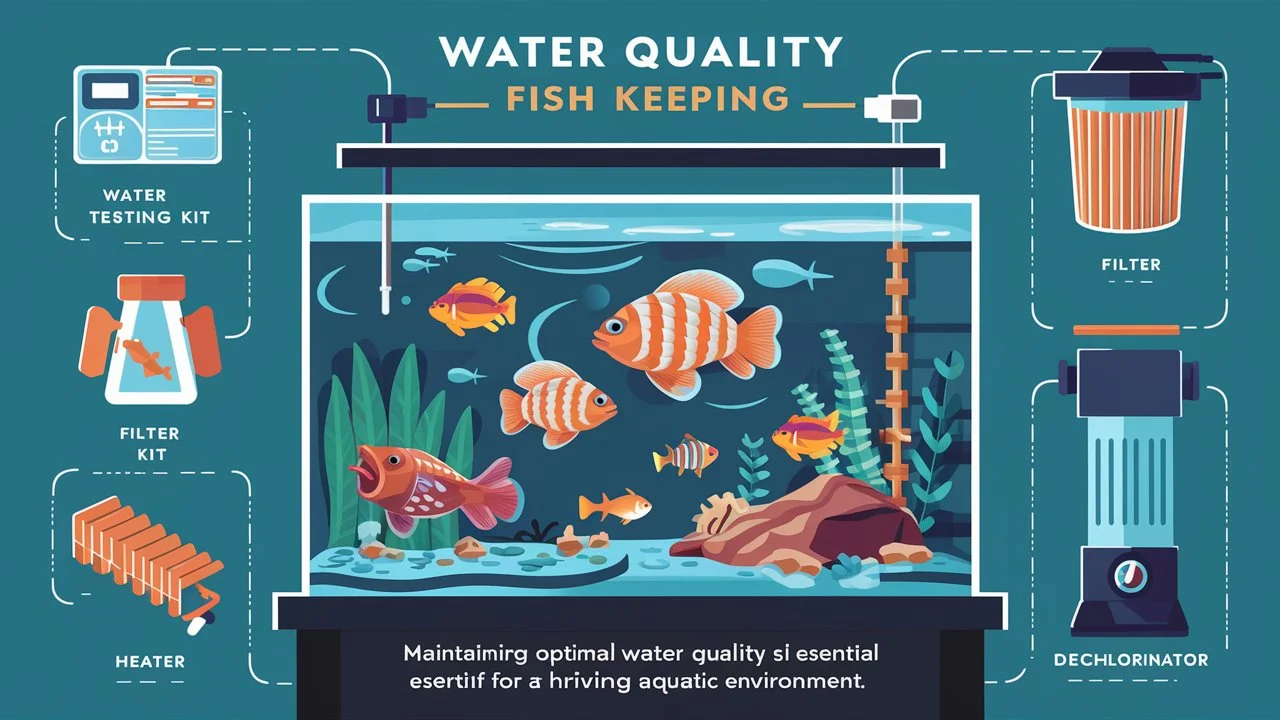
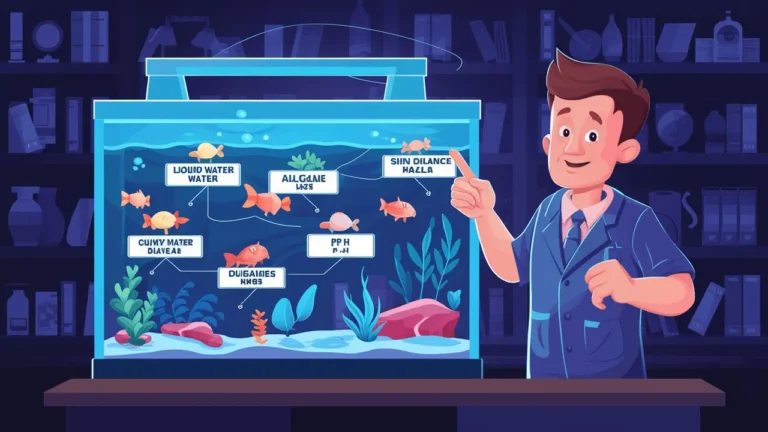
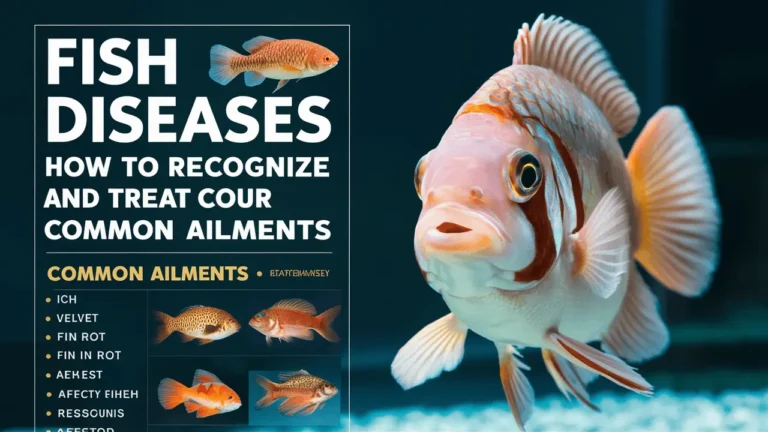




I don’t think the title of your article matches the content lol. Just kidding, mainly because I had some doubts after reading the article.
Hey there, I love all the points you made on that topic. There is definitely a great deal to know about this subject, and with that said, feel free to visit my blog 67U to learn more about Airport Transfer.
Can you be more specific about the content of your article? After reading it, I still have some doubts. Hope you can help me. https://accounts.binance.com/pt-PT/register?ref=DB40ITMB
Can you be more specific about the content of your article? After reading it, I still have some doubts. Hope you can help me.